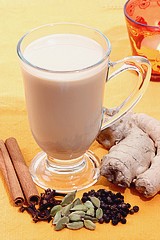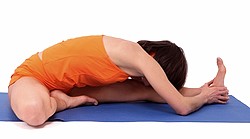For Vata people it is important to have full and regular meals; although they usually have a good appetite, their hunger is changeable, so there is a need for them to follow a strict regime with four meals according to the highest peaks of digestive fire.
Vata tends to get annoyed easily on empty stomach, and if a person has irregular meals they feel exhausted and unhealthy.
Vata Dosha Balancing Foods
At least once a day you need to have hot and heavy meals – a soup, brown rice, etc. Breakfast and lunch should be satisfying and dense.
 Ayurveda prescribe drinking a glass of hot milk with ginger, turmeric, saffron, cardamom or cinnamon before going to bed.
Ayurveda prescribe drinking a glass of hot milk with ginger, turmeric, saffron, cardamom or cinnamon before going to bed.
The best food for Vata dosha is sweet, oily and nutritious food; warming spices are good as well (black pepper, etc.). But Vata people should avoid dry, expired, too cold or overcooked foods as well as cultured dairy products. The meals should contain bitter and astringent taste in minimal quantities only.
Never try to relief stress by eating. During meals avoid reading, watching TV or talking, because Vata is very sensitive to psycho-emotional stress.
It is not that you only need to eat vata dosha balancing foods, but such foods should definitely dominate in your meals. If you notice that some particular food bring your dosha to imbalance, then it is better to avoid them altogether – why should you suffer?
If you want to be healthy and satisfied with your life, you need to balance your Vata dosha choosing the right foods and right activities.
Practical Tips for Grounding Vata Dosha
Cultivate patience; do not exercise self-criticism and condemnation of others. Doing so you will be able to reconcile spiritual and material sides of your personality and achieve harmony.
Keep in mind that fall is the Vata season, so expect a probable Vata imbalance during this time. To prevent this follow the vata guidelines precisely, and watch your mental and physical condition.
The best type of work for Vata is the one which is quiet, routine, with calming effect.
The air in your home should be fairly moist; avoid drafts as vata is very sensitive to air movement.
Do not over-strain yourself, don’t get too exhaustive due to intense load; better choose mild methods of physical activity such as qigong, walking, short swimming, golfing, jogging, tennis, badminton, wushu. Yoga is particularly good for balancing Vata dosha.
 Spiritual practices on a daily basis are very beneficial for Vata-dosha. Especially good are pranayama and relaxation practices such as shavasana and yoga nidra. In yoga prefer poses that massage your abdomen and promote the flexibility of the spine, such as janu sirsasana and paschimottanasana.
Spiritual practices on a daily basis are very beneficial for Vata-dosha. Especially good are pranayama and relaxation practices such as shavasana and yoga nidra. In yoga prefer poses that massage your abdomen and promote the flexibility of the spine, such as janu sirsasana and paschimottanasana.
Try going to bed earlier – thus you will be able to fully restore your energy and wake up refreshed. The best time to get up for Vata is the early morning.
Relaxing massage is great for your type; it is also beneficial to inhale the aroma of cloves, anise, basil, lemon and orange peel, fennel, cardamom, cinnamon, and verbena.
Follow the Vata dosha balancing diet, do the right types of physical activity – and you will be able to keep your dosha in harmony and balance. Make this activity an art of your life and live happily.
